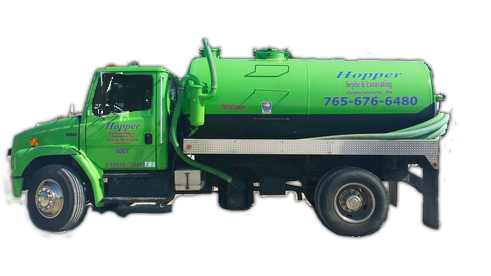Tips For Septic Owners
Proven leaders in our industry, because of our reputation, expertise, and experience serving
our community since 1952
THINGS YOU DON'T WANT TO DO WHEN MAINTAINING YOUR SEPTIC SYSTEM
Don't use a garbage disposal
Garbage disposals add solids and grease which can build-up quickly and clog or choke your drainfield. If you absolutely must use one, try to limit your use as much as possible.
Don't flush anything except toilet paper into your septic system
This includes diapers, cigarette butts, coffee grounds, sanitary napkins, tampons, condoms, grease, oils, unwanted medications or paper products other than toilet paper. Products labeled as "flushable" may not be suitable for an on-site sewage system.
Don't put household chemicals down the drain
This includes chemicals such as paint products, drain and floor cleaners, motor oil, antifreeze, and pesticides. These chemicals destroy bacteria in your system that are necessary to break down solids.
Long-term use of medications, such as antibiotics, may also destroy important bacteria in your septic tank and drain field.
Don't park cars and trucks on your drainfield or septic tank
In addition, keep patios, carports, decks, storage sheds, sports courts, landscaping plastic, and grazing animals off the drainfield and drainfield reserve areas. This will prevent soils from being packed down and pipes from breaking.
Don't use septic tank additives
These products may be harmful by adding extra solids to the system that can clog your drainfield. The chemicals can also pollute ground and surface water. It is unlawful to use any non-approved additive.
Don't drain water from hot tubs into your septic system
Large volumes of water can 'drown' your drainfield and chlorine can destroy important bacteria in your septic tank and drainfield. Drain hot tubs away from the system, especially the drainfield.
THINGS YOU SHOULD DO TO MAINTAIN YOUR SEPTIC SYSTEM
Regularly inspect and maintain your septic system
Routine maintenance can lengthen the life of your septic system. The frequency of maintenance depends on the type of system, ranging from 3 months to 3 years. Gravity and Pump to Gravity system owners may inspect their own system, or hire a Certified Pumper.
Pump your septic tank every 3-5 years
How often you pump depends on the amount of water use in your household or business. General rule of thumb: the more people using your septic system = increased water flow = your septic tank will fill up faster = more frequent pumping.
Be water-wise
Using less water may increase the life of your septic system. Using too much water is a frequent factor in failed systems.
Quickly repair all leaky faucets and toilets
This is one of the easiest ways to be water wise. "Even apparently very slow leaks, such as a slowly dripping faucet, can generate 15 to 20 gallons (57 to 76 liters) of wastewater per day," according to the USEPA Onsite Wastewater Treatment Systems Manual.
Use "low flow" fixtures on faucets and shower heads (these may be found at most hardware stores)
Some examples are:
Faucet insert: device that slows water flow
Faucet aerator: device that adds air to spread the water flow
Reduced flow faucet: the faucet is built for low water flow
Mixing valves: one fixture regulates hot and cold water
Spread laundry washing throughout the week and wash full loads
Dishwashers and washing machines should not be run at the same time.
Don't flush anything except toilet paper into your septic system
This includes diapers, cigarette butts, coffee grounds, sanitary napkins, tampons, condoms, grease, oils, unwanted medications or paper products other than toilet paper. Products labeled as "flushable" may not be suitable for a septic system.
Don't drain water from hot tubs or swimming pools into your septic system
Large volumes of water can 'drown' your drainfield and chlorine can destroy important bacteria in your septic tank and drainfield. Drain hot tubs away from the system, especially the drainfield.
Landscape with love
Grass is the best cover for your septic tank and drainfield. Other plants with very shallow root systems can also be used for landscaping.
Keep septic tank lids easily accessible
Have "risers" installed to make septic tank pumping and monitoring visits easier and less time-consuming. A "riser" also makes pumping and monitoring cause less mess and disruption in your yard. Contact a certified Installer or Pumper about their services.
Contact a certified professional to repair your system
Prevent costly future system problems by contacting a certified professional, such as an Installer, Designer, or qualified professional Engineer to repair your system.

